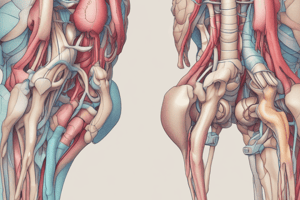Podcast
Questions and Answers
Where are secondary cartilaginous (symphysis) joints typically located?
Where are secondary cartilaginous (symphysis) joints typically located?
- Along the midline of the body (correct)
- Along the sides of the body
- At the tips of the fingers and toes
- In the facial bones
Which type of joint allows for growth in the length of a bone?
Which type of joint allows for growth in the length of a bone?
- Synovial joints
- Fibrous joints
- Secondary cartilaginous (symphysis) joints
- Primary cartilaginous (synchondrosis) joints (correct)
Which type of cartilage lines the articular surfaces in secondary cartilaginous (symphysis) joints?
Which type of cartilage lines the articular surfaces in secondary cartilaginous (symphysis) joints?
- Elastic cartilage
- Hyaline cartilage (correct)
- Fibrocartilage
- Fibrous cartilage
What happens to the epiphysial plate in primary cartilaginous (synchondrosis) joints when full growth is achieved?
What happens to the epiphysial plate in primary cartilaginous (synchondrosis) joints when full growth is achieved?
Which of the following is NOT an example of a secondary cartilaginous (symphysis) joint?
Which of the following is NOT an example of a secondary cartilaginous (symphysis) joint?
Flashcards are hidden until you start studying
Study Notes
Cartilaginous Joints (Amphiarthrosis)
- Bones are joined by cartilage, or by cartilage and fibrous tissue.
- Two types of cartilaginous joints: primary cartilaginous (synchondrosis) and secondary cartilaginous (symphysis).
Primary Cartilaginous Joints (Synchondrosis)
- Bony ends (articular surfaces) are fused by hyaline cartilage.
- Example: Epiphysial plate of growing long bones connecting the diaphysis with the epiphysis.
- Permit growth in the length of a bone.
- When full growth is achieved, the epiphysial plate converts to bone and the epiphyses fuse with the diaphysis.
Secondary Cartilaginous Joints (Symphysis)
- Articular surfaces are lined by hyaline cartilage with an intervening fibrocartilaginous disc.
- Joints are strong, slightly movable, and united by fibrocartilage.
- Located along the midline of the body.
- Examples: Intervertebral joints between vertebral bodies, manubriosternal joint, and symphysis pubis.
Studying That Suits You
Use AI to generate personalized quizzes and flashcards to suit your learning preferences.




